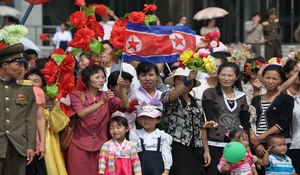
Getting Messages Through: The Cognition of Influence with North Korea and East Asia
Getting Messages Through: The Cognition of Influence with North Korea and East Asia Author: Dr. Nicholas Wright (Intelligent Biology) This publication was released as part of SMA’s Strategic Outcomes in the Korean Peninsula project. For more information regarding this project, please click here. Executive Summary To cause intended effects—and avoid unintended effects—in the fiendishly complex […]
Continue ReadingApproaches and Measures to Stabilizing the Korean Peninsula – A Korea Strategic Outcomes Virtual Think Tank Report
[Q2] Is there anything the US can do to empower the ROK to negotiate a solution that would remove both the nuclear and conventional instabilities on the peninsula? This publication was released as part of SMA’s Strategic Outcomes in the Korean Peninsula project. For more information regarding this project, please click here. Author: Weston Aviles […]
Continue ReadingNarratives Before & After the 2018 North Korea- United States Summit: An Analysis of Chinese and Russian News Media Coverage of Events on the Korean Peninsula
Narratives Before & After the 2018 North Korea- United States Summit: An Analysis of Chinese and Russian News Media Coverage of Events on the Korean Peninsula This publication was released as part of SMA’s Strategic Outcomes in the Korean Peninsula project. For more information regarding this project, please click here. Authors: Dr. Skye Cooley (Oklahoma […]
Continue ReadingAssessment of Possible Reactions in German-Speaking and East Central Europe and the European Union (GS-ECE/EU) to Possible Strategic Outcomes in U.S.-DPRK Relations
Assessment of Possible Reactions in German-Speaking and East Central Europe and the European Union (GS-ECE/EU) to Possible Strategic Outcomes in U.S.-DPRK Relations This publication was released as part of SMA’s Strategic Outcomes in the Korean Peninsula project. For more information regarding this project, please click here. Author: Dr. David Dorondo (Western Carolina University & STRATCOM […]
Continue ReadingHow the US Can Work With Its Partners to Contest DPRK Operations – A Korea Strategic Outcomes Virtual Think Tank Report
[Q5] How does the US, working with its partners, best contest DPRK operations? Author: George Popp (NSI, Inc.) This publication was released as part of SMA’s Strategic Outcomes in the Korean Peninsula project. For more information regarding this project, please click here. Summary Response This report summarizes the input of 15 insightful responses from the […]
Continue ReadingKey Actor Interests in the Asia Pacific – A Korea Strategic Outcomes Virtual Think Tank Report
[Q8] How do key actors in the Asia Pacific (Australia, China, Indonesia, Japan, Malaysia, North Korea, Philippines, Russia, South Korea, and the United States) define their key national interests / regional objectives in Northeast Asia and the Western Pacific? What are seen by each actor to be the major threats to each interest? Are there […]
Continue Reading
Marketization of the North Korean Economy – A Korea Strategic Outcomes Virtual Think Tank Report
[Q7] Many analysts indicate that due to the partial marketization of the North Korean economy, the economy has stabilized somewhat. What were the key reasons the regime made the decision to marketize? What factors inhibit a broader marketization of the economy? This publication was released as part of SMA’s Strategic Outcomes in the Korean Peninsula […]
Continue Reading